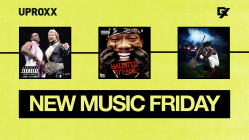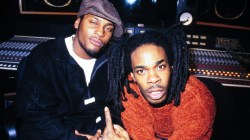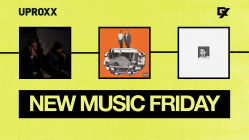Earlier this month, veteran A&R Riggs Morales set off a social media debate with an Instagram post that started: “If you’re wondering why shit all sounds the same, it’s because producers are all sending around the same shit. Not a single one of them names is moving the needle on the sonics.”
It was an explosive statement to say the least: the argument about whether the current state of music is due to the labels or the creators has been going on for decades now. I can completely understand how someone like Riggs could get frustrated by getting flooded with beats that sound similar; especially the diversity of his current artist roster at Atlantic Records. (Riggs previously worked at Eminem’s Shady Records during its early days and was instrumental in developing many of the artists who came through there as well.)
The frustration he expressed has a deep systemic origin, but it affects all parties involved in this record-making process. I’ve been privy to this simple, yet complex issue throughout my 20-plus year career running our support and education platform, istandard, advocating for the new music creator community, as well as managing producers whose expertise ranges from “new kid on the block” to Grammy-winning, platinum producers.
Let me try to shine some light on the complex part.
Peep the scenario: an up-and-coming producer hears a popular record on the radio and thinks he or she needs to compete with that sound. What many don’t take into consideration is that, from creation to placement to recording and release, that “new” hit record could be as much as three years old. That sound may live on for another year or so, but during that time, major label artists or A&Rs looking for a similar sound more than likely have access to the producer who created that hit. The expectation, then, when they turn to newer producers is for innovation: they’re trying to catch what’s next.
At the same time, any producer who has ever been in a meeting at a label has actually heard an A&R specifically say, “I need beats like [insert hot record, artist or producer]. When they don’t use that point of reference, that same A&R might say, “I just need heat” or “I just need hits.” Unlike more seasoned, hands-on A&Rs like Riggs, who are really in tune with their artists and the overall projects they’re shopping for, most have a hard time articulating what they want or are looking for specifically. Even though it should be the A&R’s job to help the artist define creative direction and be able to communicate that to the producer, many simply don’t know-how.
https://www.youtube.com/watch?v=yYH3SiMXc2E
Of course, the blame doesn’t rest solely on the A&R or even the artist’s shoulders.
In this hyper-connected world, today’s artists and labels have a variety of options when it comes to finding music: in addition to soliciting beats via social media or making an email address available for submissions, they can also turn to SoundCloud, YouTube or online marketplaces like Airbit and Beatstars, which allow producers to sell or lease their beats. Not to mention the countless beat battles, producer showcases and other industry events that allow artists and A&Rs to connect with producers.
I’m sure someone like Riggs has an inbox full of beats from up-and-comers trying to get on his radar. Which makes it easy to suggest that, if he keeps his ear to the streets, so to speak, he won’t miss a beat. Pun intended.
Are you confused yet?
Where most newcomers miss the mark, unfortunately, is by failing to realize that, in any given A&R’s inbox, they are also competing with established producers who either already have relationships with the majors, or whose sound is already in demand. And nine times out of ten, it’s easier for newcomers to be discovered through the many options listed above than it is for them to make it into these label offices or stand out in these over-crowded inboxes.
Which brings me to the simple part of our simple/complex issue: a lot of times beat makers are trying to find themselves style-wise, so they emulate popular producers or try to follow a specific sound because they think that’s the way to get on. Rather than focus on chasing the elusive major label placement, new producers should put the same amount of effort into building relationships directly with new artists. In most cases, this will help you create and develop your own style. Being a part of the record that breaks a new artist also attaches you to that artist’s legacy from day one.

Photo: Gary Friedman/Los Angeles Times via Getty Images
The goal should be just be you, gain experience and practice everyday on being better than yesterday. Even if your sound is too advanced or different for NOW, which isn’t really a thing, if you can compete sonically, an established artist or an A&R with vision like Riggs Morales, might take a chance on you. Then people will be chasing your sound.
Sound like a simple enough fix, right?
Jason “J Hatch” Hadshian is the co-Ceo & co-founder of istandard, which coordinates over 100 events a year in 30-plus U.S. markets, Canada and the U.K. His latest book, How I Left My Job & Made It In The Music Industry is currently available on Amazon. Follow him on Instagram @mogulstatus.
[apple_news_ad type=”standard”]












By representing where you come from not in just the way you look but also in the sound you create and not imitating Atlanta/Playboy
changes by itself
first 3 and last 3 year of the decade decide
drake was getting big in 09 2019 he’s one of the biggest
this is off topic i don’t give a fuck tho
Too many young rappers looking for a hit (following the trend).
Corporations are shutting down hip hop for rap. They wouldn’t play hip hop because it’s about talent and skills. Rap is watered down pop shit like mathers. Hip hop would kill rap on the radio. Who wants to hear the same song 24/7?. The radio is dead not hip hop remember that. Corporations look for so called hot music that is really garbage. I’ve listen to great artists and classic records. Rap cares more about money than the art. Corporations don’t seek out talent anymore. They find the near kid off the street. The kid uses ghostwriters. The music always has auto tunes and the same flow. One day talented people will be replace by people who have little talent. BRING BACK REAL MUSIC!
Music as a whole gonna be replaced with AI and holograms soon